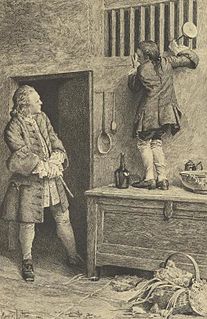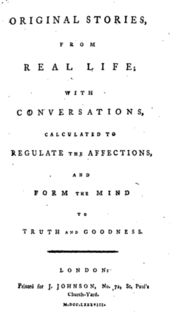
A Vindication of the Rights of Woman: with Strictures on Political and Moral Subjects (1792), written by British proto-feminist Mary Wollstonecraft (1759–1797), is one of the earliest works of feminist philosophy. In it, Wollstonecraft responds to those educational and political theorists of the eighteenth century who did not believe women should receive a rational education. She argues that women ought to have an education commensurate with their position in society, claiming that women are essential to the nation because they educate its children and because they could be "companions" to their husbands, rather than mere wives. Instead of viewing women as ornaments to society or property to be traded in marriage, Wollstonecraft maintains that they are human beings deserving of the same fundamental rights as men.

Jean-Jacques Rousseau was a Genevan philosopher, writer, and composer. His political philosophy influenced the progress of the Age of Enlightenment throughout Europe, as well as aspects of the French Revolution and the development of modern political, economic, and educational thought.

Pierre Marie René Ernest Waldeck-Rousseau was a French Republican politician who served as the 29th Prime Minister of France.

Auguste Émile Faguet was a French author and literary critic.

Ermenonville is a commune in Oise, France. Ermenonville is notable for its park named for Jean-Jacques Rousseau by René Louis de Girardin. Rousseau's tomb was designed by the painter Hubert Robert, and sits on the Isle of Poplars in its lake.

The Barbizon school of painters were part of an art movement towards Realism in art, which arose in the context of the dominant Romantic Movement of the time. The Barbizon school was active roughly from 1830 through 1870. It takes its name from the village of Barbizon, France, on the edge of the Forest of Fontainebleau, where many of the artists gathered. Most of their works were landscape painting, but several of them also painted landscapes with farmworkers, and genre scenes of village life. Some of the most prominent features of this school are its tonal qualities, color, loose brushwork, and softness of form.

Emile, or On Education is a treatise on the nature of education and on the nature of man written by Jean-Jacques Rousseau, who considered it to be the "best and most important" of all his writings. Due to a section of the book entitled "Profession of Faith of the Savoyard Vicar", Emile was banned in Paris and Geneva and was publicly burned in 1762, the year of its first publication. During the French Revolution, Emile served as the inspiration for what became a new national system of education.

The Confessions is an autobiographical book by Jean-Jacques Rousseau. In modern times, it is often published with the title The Confessions of Jean-Jacques Rousseau in order to distinguish it from Saint Augustine's Confessions. Covering the first fifty-three years of Rousseau's life, up to 1765, it was completed in 1769, but not published until 1782, four years after Rousseau's death, even though Rousseau did read excerpts of his manuscript publicly at various salons and other meeting places.

Montmorency is a commune in the northern suburbs of Paris, France. It is located 15.3 km (9.5 mi) from the center of Paris.

Julie; or, The New Heloise, originally entitled Lettres de Deux Amans, Habitans d'une petite Ville au pied des Alpes, is an epistolary novel by Jean-Jacques Rousseau, published in 1761 by Marc-Michel Rey in Amsterdam.

Original Stories from Real Life; with Conversations Calculated to Regulate the Affections, and Form the Mind to Truth and Goodness is the only complete work of children's literature by the 18th-century English feminist author Mary Wollstonecraft. Original Stories begins with a frame story that sketches out the education of two young girls by their maternal teacher Mrs. Mason, followed by a series of didactic tales. The book was first published by Joseph Johnson in 1788; a second, illustrated edition, with engravings by William Blake, was released in 1791 and remained in print for around a quarter of a century.

Joy of Learning is a 1969 film by Jean-Luc Godard. The shooting started before the events of May 68 and was finished shortly afterwards. Coproduced by the O.R.T.F., the film was upon completion rejected by French national television, then released in the cinema where it was subsequently banned by the French government. The film is an adaptation of Emile, or On Education, Jean-Jacques Rousseau's treatise on education, and its title is a reference to Nietzsche's The Gay Science. The film was entered into the 19th Berlin International Film Festival.
Events from the year 1900 in France.
Essay on the Origin of Languages is an essay by Jean-Jacques Rousseau published posthumously in 1781. Rousseau had meant to publish the essay in a short volume which was also to include essays On Theatrical Imitation and The Levite of Ephraim. In the preface to this would-be volume, Rousseau wrote that the Essay was originally meant to be included in the Discourse on Inequality, but was omitted because it "was too long and out of place". The essay was mentioned in Rousseau's 1762 book, Emile, or On Education.

Les aventures de Télémaque, fils d'Ulysse is a didactic novel by François Fénelon, Archbishop of Cambrai, who in 1689 became tutor to the seven-year-old Duc de Bourgogne. It was published anonymously in 1699 and reissued in 1717 by his family. The slender plot fills out a gap in Homer's Odyssey, recounting the educational travels of Telemachus, son of Ulysses, accompanied by his tutor, Mentor, who is revealed early on in the story to be Minerva, goddess of wisdom, in disguise.
Émile Gravelle (1855–1920) was a French individualist anarchist and naturist activist, writer and painter. He published the review L'État Naturel (1894–1898) and collaborated with Henri Zisly and Henri Beylie on La Nouvelle Humanité, Le Naturien (1898), Le Sauvage (1898–1899), L'Ordre Naturel (1905), and La Vie Naturelle (1907–1914). His ideas were important in individualist anarchist circles in France as well as Spain, where Federico Urales promoted the ideas of Gravelle and Zisly in La Revista Blanca (1898–1905).
Amour de soi is a concept in the philosophy of Jean-Jacques Rousseau that refers to the kind of self-love that humans share with brute animals and predates the appearance of society.

Jacob Vernes was a Genevan theologian and Protestant pastor in Geneva, famous for his correspondence with Voltaire and Rousseau.

Sabrina Bicknell, better known as Sabrina Sidney, was a British woman abandoned at the Foundling Hospital in London as a baby, and taken in at the age of 12 by author Thomas Day, who tried to mould her into his perfect wife. She grew up to marry one of Day's friends, instead, and eventually became a school manager.

Argenteuil is an 1874 oil on canvas painting by Édouard Manet (1832-1883), first exhibited at the Paris Salon of 1875. It is one of Manet's first works to qualify fully as an Impressionist work, due to its naturalistic subject and its bold palette, such as the blue of the river, mocked by the Figaro journalist Jean Rousseau as "in the foreground, Argenteuil jam on an indigo river" It is now in the Musée des beaux-arts in Tournai, Belgium.















